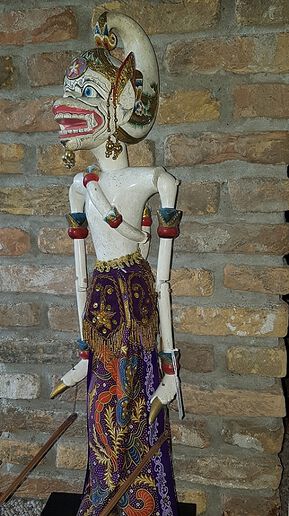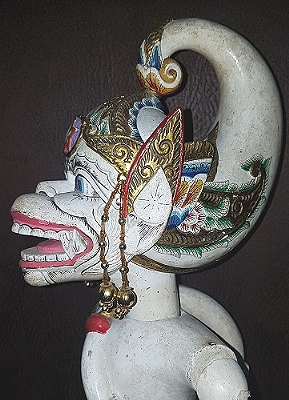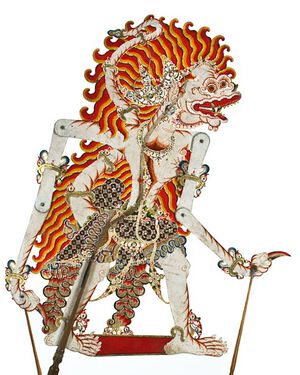Hanoman
| Title | Hanoman - (Raden) - Ramayana - Mahabharata |
|---|---|
| Other names | Anjaniputra, Bayutanaya, Kapiwara, Anoman, Maruti, Mayangkara, Perbancanasuta, Ramadayapati, Srenggana |
| Size | 65 cm |
| Personal data | Hanoman is the son of Betara Guru and Dewi Anjani, a princess with the face and hands of a monkey. |
| Appearance | Anoman monkeys have white, cotton-like fur, white long eyes, nose and mouth of an ape. |
| Collection | Private collection |
Hanoman – (Raden) – Ramayana – Mahabharata
Hanuman appears in the millennia-old heroic epic the Ramayana, he symbolizes bhakti (devotion) and is especially popular in the north of India. According to some researchers, the Chinese mythological figure Sun Wukong (Son Goku) was inspired by Hanoman.
In another version, it is said that while Anjani was meditating to worship Shiva, in another place, King Dasarata performed Putrakama Yadnya to have children. He received some food to be shared with his three wives, who then eventually gave birth to Rama, Laksmana, Bharata and Satrugna. And by the will of the Gods, a bird took a piece of the food, then dropped it in the forest where Anjani was meditating. Bayu, the wind god, delivered the food so that it fell into Anjani's hands. Anjani ate the food, and Hanoman was born.
It is also mentioned in another version, that Hanoman was born because of the relationship between Bayu and Anjani. One day, the God Bayu saw Anjani's beauty, then hugged her. Anjani was of course angry because she felt insulted, but the God Bayu replied that Anjani would not be tarnished by Bayu's touch. He did not hug Anjani's body but in her heart. Bayu also said that Anjani would give birth to a son who had the same strength as Bayu.
When Hanoman was little, he thought the sun was an edible fruit, so he flew towards it and was about to eat the sun. The God Indra who saw this, immediately anticipated it by throwing lightning at Hanoman, so that he fell and hit a mountain. The God Bayu was angry with what the God Indra did. As a result, all creatures on earth became weak. The Gods begged the God Bayu to stop his anger. The God Bayu finally stopped his anger and Hanoman received a gift. The God Brahma and Indra gave Hanoman a gift that he would be immune to all weapons. And his death would come by his own will. So, Hanoman became an immortal being.
Sugriwa, Hanoman's uncle, was worried when he saw Rama and Laksmana coming to Kiskenda. He was worried that they were Subali's envoys who were sent to kill him. Then Hanoman was sent by Sugriwa to investigate the purpose of Rama and Laksmana's arrival. Hanoman then disguised himself as a brahmana and approached Rama and Laksmana. After meeting Rama and Laksmana, they told each other their life stories and Rama told him the purpose of his visit to meet Sugriwa. Because he did not feel any bad signs, Hanoman returned to his original form and took Rama and Laksmana to meet Sugriwa.
The abduction of Sita
After Rama and Laksmana helped Sugriwa to reclaim Kiskenda from his brother Subali, Sugriwa helped Rama to find Sita. He sent the Wanara troops to go to all corners of the earth to find Sita. The troops were led by Hanoman, Anggada, Nila, Jembawan and others. They explored a cave, but then got lost and found a city standing majestically in it. According to Swayambara, the city was built by the architect Mayasura, but is now deserted because Maya has gone to the realm of the Gods. Hanoman told Swayam praba the purpose of his journey. With Swayampraba's help, Hanoman and the Wanara troops disappeared from the cave and were on a beach in an instant.
On the beach, Hanoman and the wanara troops met Sempati, a giant bird without wings. Sempati overheard the wanara's conversation about Sinta and the death of Jatayu (Sempati's younger brother). Hearing that, Sempati was sad and asked to tell the real story. Anggada then told what had really happened and asked for Sempati's help. With Sempati's explanation, they finally learned that Sinta was being held captive in a palace located in the Alengka kingdom. The kingdom was ruled by a giant king named Rahwana.
Hanoman immediately used all his strength. He immediately performed triwikrama, transforming himself into the size of a mountain. By concentrating his strength on his feet, he set his feet on the ground with full force. His muscular body shot up like a meteor into space. Hanoman flew into space. Passing through mountains and oceans. Suddenly, an obstacle came his way. A giant ghost from Alengka named Wilkataksani immediately opened his mouth very wide. Hanoman was sucked into his stomach. However, Hanoman was not just any young man. With the strength of his strength and the sharpness of his nails, the giant Kataksini's stomach was made into a mess. Wilkataksani died with a surgical stomach.
Hanoman landed safely in Alengka. He cleverly set up a strategy. He immediately made his body small, like a baby monkey. Hanoman comes to Rahwana's palace and observes everything there, especially the countless beautiful women, but he does not find Sinta there. He then enters a garden called Taman Arga Soka that he has never been to. There he found a beautiful woman. Her body was thin but had an extraordinary aura of majesty. He was convinced that the woman was the goddess Sinta.
At that time, Hanoman saw Rahwana wooing Sinta. But like the previous days, Rahwana always failed to woo Sinta to become his queen. Hanoman then approached Sinta and told her the purpose of his visit. At first Sinta was suspicious, but Hanoman then handed over Rama's ring (Sint's husband), Sinta's suspicions disappeared. Hanoman actually invited Sinta to fly with him and return to Rama, but Sinta refused because she does not want him to touch her (only her husband Rama is allowed to do that). Sinta also expected Rama to come himself as a true knight to save her. Hanuman could not force it and then takes a golden flower with him, with which he can prove to Rama that Sita is still alive.
Before Hanoman left Alengka, he destroyed the Asoka garden in Rahwana's palace. He killed thousands of soldiers including Rahwana's chosen soldiers, Jambunali and Aksha. Hanoman was successfully captured by Indrajit with the Brahma Astra weapon. The weapon wrapped around Hanoman's body, but the Brahma Astra's supernatural powers disappeared when the giant soldiers added straw ropes. When Rahwana was about to sentence Hanoman to death, Wibisana defended him so that his sentence would be reduced because he was only a messenger. Finally, Rahwana only gave the punishment that Hamonan's tail be burned. Sinta prayed that the fire that burned Hanoman would be cool. Dewa Agni granted Sinta's prayer, and the fire that burned Hanoman's tail became cool.
Hanoman then rebelled and released Brahma Astra. Hanoman performed triwikrama, becomming great and terrible. His blazing tail burned the city of Alengka. The city of Alengka became a sea of fire except for Sinta's residence.
Hanoman then threw himself into the sea and the fire burning his tail went out. He then returned to face Rama and gave news about Sinta. After hearing the report from Hanoman, Rama, assisted by the Wanara, devised a strategy to attack Alengka.
In the battle between Rama and Rahwana, Anoman managed to kill many giant soldiers. When Rama, Laksmana, and the other Wanara troops were trapped by the Nagapasa weapon, on Jembawan's advice, Hanoman went to the Himalayas to find medicinal plants. However, Hanoman did not know exactly what the characteristics of the tree in question were, so he cut the mountain and brought the pieces to Rama. Finally, Rama and his troops recovered. Finally, they won the battle, and they managed to save Sinta.
As a form of gratitude and appreciation, Rama wanted to give a gift to Hamonan. However, Hanoman refused because he only wanted Sri Rama to reside in his heart. Rama understood Hanoman's intentions and resided in his body. Hanoman then meditated on the top of the mountain to pray for the safety of the world.
After the era of Sri Rama, came the Pendawa era, during which Anoman nurtured the five Pendawa and lived as a monkey priest in Kendalisada. Anoman is always a place to ask people about difficult matters, because it is considered a vigilant priest.
Source: History of Wayang Purwa - Hardjowirogo - PN Balai Pustaka – 1982
Blog: Hadisukirno – Yogyakarta – 2011



